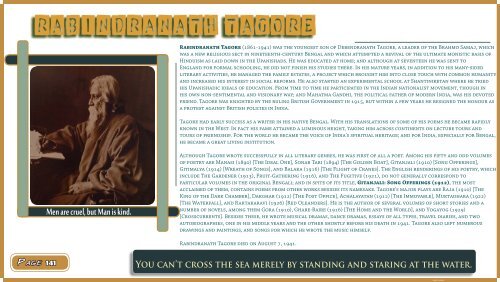Create successful ePaper yourself
Turn your PDF publications into a flip-book with our unique Google optimized e-Paper software.
Rabindranath Tagore<br />
Rabindranath Tagore (1861-1941) was the youngest son of Debendranath Tagore, a leader of the Brahmo Samaj, which<br />
was a new religious sect in nineteenth-century Bengal and which attempted a revival of the ultimate monistic basis of<br />
Hinduism as laid down in the Upanishads. He was educated at home; and although at seventeen he was sent to<br />
England for formal schooling, he did not finish his studies there. In his mature years, in addition to his many-sided<br />
literary activities, he managed the family estates, a project which brought him into close touch with common humanity<br />
and increased his interest in social reforms. He also started an experimental school at Shantiniketan where he tried<br />
his Upanishadic ideals of education. From time to time he participated in the Indian nationalist movement, though in<br />
his own non-sentimental and visionary way; and Mahatma Gandhi, the political father of modern India, was his devoted<br />
friend. Tagore was knighted by the ruling British Government in 1915, but within a few years he resigned the honour as<br />
a protest against British policies in India.<br />
Tagore had early success as a writer in his native Bengal. With his translations of some of his poems he became rapidly<br />
known in the West. In fact his fame attained a luminous height, taking him across continents on lecture tours and<br />
tours of friendship. For the world he became the voice of India's spiritual heritage; and for India, especially for Bengal,<br />
he became a great living institution.<br />
Men are cruel, but Man is kind.<br />
Although Tagore wrote successfully in all literary genres, he was first of all a poet. Among his fifty and odd volumes<br />
of poetry are Manasi (1890) [The Ideal One], Sonar Tari (1894) [The Golden Boat], Gitanjali (1910) [Song Offerings],<br />
Gitimalya (1914) [Wreath of Songs], and Balaka (1916) [The Flight of Cranes]. The English renderings of his poetry, which<br />
include The Gardener (1913), Fruit-Gathering (1916), and The Fugitive (1921), do not generally correspond to<br />
particular volumes in the original Bengali; and in spite of its title, Gitanjali: Song Offerings (1912), the most<br />
acclaimed of them, contains poems from other works besides its namesake. Tagore's major plays are Raja (1910) [The<br />
King of the Dark Chamber], Dakghar (1912) [The Post Office], Achalayatan (1912) [The Immovable], Muktadhara (1922)<br />
[The Waterfall], and Raktakaravi (1926) [Red Oleanders]. He is the author of several volumes of short stories and a<br />
number of novels, among them Gora (1910), Ghare-Baire (1916) [The Home and the World], and Yogayog (1929)<br />
[Crosscurrents]. Besides these, he wrote musical dramas, dance dramas, essays of all types, travel diaries, and two<br />
autobiographies, one in his middle years and the other shortly before his death in 1941. Tagore also left numerous<br />
drawings and paintings, and songs for which he wrote the music himself.<br />
Rabindranath Tagore died on August 7, 1941.<br />
Page 141<br />
You can’t cross the sea merely by standing and staring at the water.<br />
Abhi Sharma


